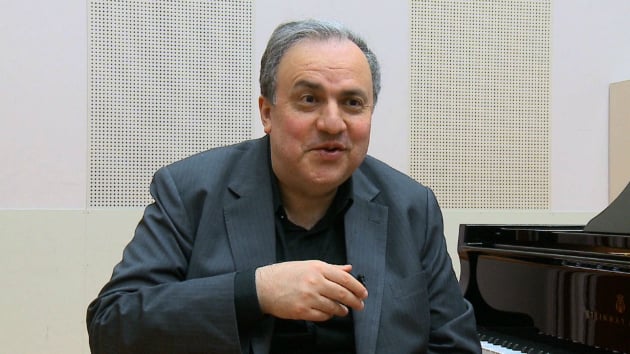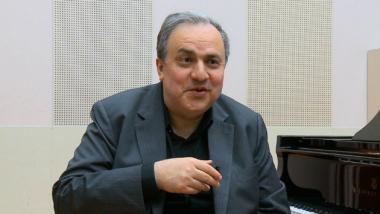
Yefim Bronfman is: Fima to friends; a powerhouse pianist of such virtuosic muscle as to have been dubbed “the brontosaur” by author Philip Roth in his novel The Human Stain; a dedicated foodie/former Iron Chef judge; a renowned Prokofiev specialist who is bringing that composer’s complete cycle of nine (powerhouse) piano sonatas to Cal Performances this season…
A career like Bronfman’s keeps one airborne much of the time, crossing countries and continents almost daily to keep up with an incessant calendar of concert engagements. We started our call by talking about the road-warrior lifestyle of the 21st-century virtuoso.
This life in music today, the physical and mental demands of the frenetic schedule and the nonstop travel, not to mention the work itself: do you think it keeps you young, or does it all start to wear you down as the years go on?
Well, you know, in many ways the logistics of the traveling life are so much easier now than they were 100 years ago. I mean, it used to take a week to get from America to Europe, so you couldn’t practice for all that time if you were a pianist, unless you could put a piano on the ship! Or if you were taking trains everywhere, it took much longer to go from place to place.
Nowadays, I can leave for London today and practice there tomorrow morning. It’s not such a big deal to travel, so you actually have more time because of the frequency and speed of the flights themselves. Today you can get a nonstop flight anywhere you need to go.
Yes, that’s true, but I think that the pace of the career itself, the frequency of concerts and the juggling of different projects – especially for a pianist, the vast amount of repertoire that one performs back to back – the multitasking, that’s so different now. I think that the demands of the career have increased and sped up in a way that simply wasn’t imaginable when travel was slower, when the overall tempo of life was slower.
Yes, absolutely. I think the whole idea of career has changed with the introduction of high-speed transportation. When you read books about the great artists of the past, like Rubinstein or the Budapest String Quartet, you realize that they would go on tour to South America and they would spend six months there! The idea of touring was very different. Recently one of my older colleagues was telling me that in the ‘50s, he would go to Australia for six months and play everywhere, every city and town. That doesn’t happen anymore. Last year I went to Australia for 10 days.
And I think that touring has also lost a sense of geographical rationale. It seems that even the most powerful managers don’t have the ability anymore to organize tours that follow logical, physical routes. Schedules are just too difficult to coordinate I guess. So you’re always coming and going and crisscrossing back and forth.
Yes, right. And that’s much more demand and stress on your body, when you’re jumping from London to Mexico City and back to Berlin… I think especially for younger artists who are trying to break into the circuit, they have to do this to a punishing degree. I do think that hopefully as you get older and more established you are able to command a schedule that is somewhat more comfortable. But having said that, there are still a lot of exceptions one makes.
I remember I had to do these things very often when I was younger: going to South America and then Japan, and then America for three days and Europe for two days, things like this. I do think that hopefully as you get older and more established you are able to command a schedule that is somewhat more comfortable. But having said that, there are still a lot of exceptions one makes. For example, this fall I went to Europe four or five times, and back to America; it was just crazy. That’s something I avoid doing at all costs, but this year I just had to, for different reasons.
Do you think this will eventually change? I wonder, as life becomes faster and faster, will this just become unmanageable, and maybe the experience of concerts will become more and more a virtual one? Maybe musicians in the future will prefer to reach their audiences through streaming concert broadcasts, rather than by physically traveling from place to place.
You’re right, yes. Already now basically every concert is already being transmitted by internet or television anyway. You would think that it would mean that we’re reaching a much larger audience, but I don’t think we actually are. Because now the audience has so much choice at any given moment to watch whatever they want, so you are competing with a tremendous mass of entertainment and information.
I know that many of the orchestras are doing digital concert halls, but they don’t really get a lot of people to watch – it’s interesting. And you know, it’s a very costly enterprise to do that – that’s the problem. Even the greatest orchestras are losing money on it. Think about the choice you have in watching great performances online, just with YouTube. Why would you necessarily tune in to a concert by a living artist, when you already have so much choice of great performances by the great artists of the past? I know very few people who would watch a concert, Live from Lincoln Center, for example, over the internet. Even in my circle of dedicated music lovers, practically no one would do that. I think people who really love music still would prefer to go to the concert in person rather than watch at home. But it’s difficult to predict the future.
I think it’s interesting how popular the movie theater showings of the Live from the Met broadcasts have become. People really seem to love going to those.
I actually feel that this is a wonderful thing, but I think it’s probably not helping the opera house. I think there are many people who would prefer going to a movie theater than to the opera house. I mean, we’re talking about a very expensive ticket, a $250 ticket to the opera house, instead of $20 to the movie theater. That’s a huge difference. And then you have to get dressed up, you have to park the car, have dinner – it’s a $1000 evening for a couple. Whereas you can wear jeans to the movie theater, and you have absolutely fantastic production value, with surround sound and extreme close-ups and everything. From the balcony of the opera house, you really can’t even see very much.
Plus at the movie theater you can have popcorn.
You can have a popcorn, exactly, yes.
I read something you said about the beginning of your recording career, how you started playing Prokofiev’s music because when you first signed with Sony, they more or less branded you as a Prokofiev specialist, so you learned the music in order to make the recordings. It’s been many years now that you’ve been living with Prokofiev’s music. Can we talk about how you’ve experienced that process?
I started in the late ‘80s, my recording career started quite late, and I started with Prokofiev. I’m glad that happened, because it’s such wonderful music. And I’m very glad to be coming back to it now, and to have a second or third chance to play this repertoire and try to understand it better. It’s really a privilege to come back to the same repertoire 25 years later, hopefully with a different perspective. However challenging it is, it’s a wonderful thing.
We can’t get too deep into this – it’s a large topic. But the nine Prokofiev Sonatas really represent a map of his life. He composed the first one as a teenager, and he wrote the last one just a few years before he died. And in the meantime are the different phases of his life, the Russian Revolution, his exile from Russia, the years in Paris and America, two World Wars, his return to the Soviet Union – many dramatic events, a changing world … Can we talk about the emotional process of following a composer throughout his life story through his music, and especially through a large-scale cycle of his works, whether Prokofiev or Beethoven or Brahms? The sonata form lost its momentum somehow in the 19th century: After Mozart and Beethoven there weren’t so many composers who wrote a lot of sonatas, and if you think about the 20th-century composers, Prokofiev was the only one really.
First of all, it’s important that Prokofiev was really the only composer of the 20th Century who wrote so many piano sonatas. The sonata form lost its momentum somehow in the 19th century: After Mozart and Beethoven there weren’t so many composers who wrote a lot of sonatas, and if you think about the 20th-century composers, Prokofiev was the only one really. Bartok wrote one piano sonata. Ravel wrote one sonatina. He wrote a couple of violin sonatas, but piano sonatas stopped being in fashion for some reason.
For me, Prokofiev’s sonatas are a combination of old style – meaning that he kept very classically the sonata form and obeyed it in a very strict way – yet he was able to add this frenzy of the 20th Century into it. So the result is a very emotional waterfall – does that make sense in English? He covers a very classical structure with a sense of the 20th Century, both the dark periods, and the brightness of the 20th Century as well. And it’s a classical sonata form that becomes so Russian. He brings in so many things that are typical of Russian culture.
You know, every nation, every religion, has its own idiosyncratic things that are essential, and I think that Prokofiev was able to incorporate very Russian qualities into his music in a magnificent way. The sense of fairytale is very strong in his music, particularly in the earlier works. And the bells. In Russian music, there is always a moment when you hear the bells, and certainly Prokofiev is no exception. When you think about Russian culture, the bells are a constant. When a child is born the bells are ringing. When a person is dying the bells are ringing. When the wedding is happening, the bells are ringing. The later you get into the sonatas, the more obvious it is. In the late sonatas, the bells maybe become the bells of time. In the seventh sonata, you hear the bells of destruction, among the ruins of the war, and you can sense that those bells from far away are kind of ringing your destiny and your fate. Not only physical bells, but also metaphysical.
I think there’s something very meaningful about the arc of a large cycle like this. I mean, when you learn a piece of music, the essential thing, the thing that takes time and insight, is to feel the structure of the piece, the arc of it. And within these nine sonatas, you are concerned with the arc of each individual piece, and then beyond that, with the larger arc of the cycle as a whole. It’s like the Russian nesting dolls, isn’t it, to build outward in that way?
Yes, yes, very much! First of all, I like to do a cycle chronologically. I think it’s very important that the listener gets that sense of arc, from the beginning of the creation to the very end, to see how it evolves, how the energy changes, the mood changes. Like many composers, Prokofiev’s early sonatas are very vigorous, and very fiery pianistically – extremely, extremely difficult. In a way it reminds me of the early Beethoven sonatas, which are much more difficult, much harder to play, than the later sonatas. Of course as a young virtuoso pianist, Prokofiev, like Beethoven, wanted to show off his own pianism, so he wrote these brilliant sonatas. I would say the first four sonatas are like this.
And then he changes into something else. He becomes influenced by French music during the Paris years, and then of course the war happens, and the music becomes much more emotional. It’s still very challenging, but in a different way. It becomes more orchestral, you can almost forget about pianistic ideas. I always think about the later sonatas as orchestral pieces. And in the last sonata, interestingly enough, it’s almost like he is saying “I’ve seen it all, I’ve done it all, and now I just want to simply write something that is a bit more abstract and more minimalistic.” I find it very touching that the piece ends so quietly, looking back over his own career, his life. Also like Beethoven’s last sonata.
It really is the only way to feel that you truly know a composer, isn’t it? To be able to play the music that spans his whole lifetime, to understand what went into shaping him as a human being and as a musician. To observe the evolution of the work, as you say.
And this is the first time that I’m performing these sonatas as a complete cycle. Always before I’ve played three sonatas here and there, but this year, for the first time, I have the opportunity to approach the full cycle, and I’m really learning a lot, I have to say.
I want to circle back to the beginning of this conversation, on the subject of the touring life. Aside from the excessive time in spent in airplanes, there is the question of food – something of which most musicians are very fond, but also something that presents challenges on the road. When you’re performing, there’s no such thing as a normal dinner hour; instead there are all these late-night dinners with extravagant food and wine, and then getting up early, and this does become a real problem, doesn’t it?
Yes, you’re right, and I’m trying to avoid the late-night dinners. Really that’s a thing of the past for me. These days I try to be reasonable and not indulge too much, not that I always succeed! You know, there are not so many advantages to getting older, but one advantage is that you do have the ability to think ahead a little bit, and now I know that if I have to get up early and do some work, or I have to travel, I’d better not drink too much or eat too much.
In my life, I’ve been very fortunate to eat in the great restaurants of the world – not only in this country but also in Europe and Asia and Australia. I’ve tasted some great cuisines, and I guess I don’t need to prove anything anymore. On the other hand, California is really fabulous for food, and you have such wonderful restaurants, so I’m sure I will have one or two good dinners this time!

